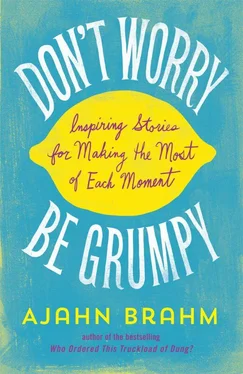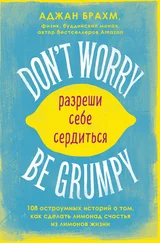Sometimes, though, a water buffalo would take fright for reasons only known to itself. Raising its head with a snort, it would charge off in any direction.
A local villager was taking his water buffalo to his fields to graze early one morning, and as he was passing our forest monastery, something in the jungle spooked the buffalo. The buffalo raised his head and snorted. The villager tried to hold him back with the thin rope tied loosely around the buffalo’s neck, but the rope quickly wound around the villager’s finger, and as the buffalo charged off, it took the top of the man’s finger with it!
The poor man came directly into our monastery for help, with his hand covered in blood and half a finger missing. We took him to the hospital and had him patched up. He soon recovered.
I often use that unfortunate tale as an example of what happens when we don’t let go.
Who is stronger, a man or a water buffalo?
It doesn’t make sense to hold on to a water buffalo when it’s charging. Let it go. The buffalo only runs off a few hundred meters and then stops by itself. Then the farmer can calmly walk after it, take hold of the rope again, and lead it to the fields to graze.
Too many people hold back what they should let go, and they lose many fingers.
The Case of the Disappearing Harley
One of the first residents at my monastery was Patrick. He was a spiritual man with no family and no fixed address. He used to travel from one monastery to another, from one spiritual community to the next. He was a temple hopper. Thus it was that he came to stay at my monastery in the early years to help with the hard physical work of building the basic facilities.
He had no house or savings. The only thing of value that he possessed was a magnificent Harley Davidson motorbike that he was very pleased with. It allowed him to travel around Australia, enjoying the freedom of being without ties to any person or place.
He wrote to me regarding his experience in a large shopping mall in Sydney. After parking his Harley in the multi-story parking lot, he purchased a few items and returned to his bike. To his shock, the parking bay was empty. Someone had stolen his Harley!
That precious bike was the only thing of value that he owned. He had saved up so long to buy it. It was the machine that gave him the freedom to roam wherever he will. Now it had been taken by some lowlife. Now he had nothing.
He’d been listening to Buddhist teachings long enough to know the meaning of attachment. He remembered the Buddha’s advice that:
All that is mine, beloved and pleasing,
will one day become separated from me.
Thus he quickly came to accept his loss, thinking something like: “Oh well. We have to let go of everything sooner or later. No point suffering over what you can’t change. I have had such wonderful times traveling around this vast land with that Harley. Now I hope that it gives such pleasure to its new owner.”
He was so pleased that the thief had only stolen his motorbike and not his peace of mind. He had successfully passed a hard test in letting go.
As he was walking away to catch public transport, smiling to himself at his spiritual achievement, he suddenly realized that he was on the wrong floor of the garage!
When he went down the stairs to the correct level, there was his Harley, smiling at him as it were. Not only had he passed the letting go test, he still had his motorbike. He had won twice over.
Well done, Patrick.
A famous painter had a bad accident on his Harley Davidson. When he woke up in hospital, the surgeon told him the bad news that they had to amputate his hand, the one he used to paint with. The painter was devastated. He had lost the ability to do the one thing he loved most in the world. With it, he had lost his life’s purpose.
As soon as he was discharged from the hospital, he entered a tall office block in the city, took the elevator to an upper floor, found an empty office, and climbed out on to the ledge. He was going to kill himself.
As he gazed the long distance down to the ground, he saw an amazing sight. There on the sidewalk was a man with no arms at all, dancing with joy along the street!
“My God!” he thought to himself, “I’ve only lost one hand, and there’s a guy with no hands at all, not even arms, and he’s dancing! What do I want to kill myself for?”
He decided to live. He stepped back from the ledge and into the empty office.
He thought to himself, “I have to find out that man’s secret — how can he be so happy with no hands?”
He ran to the elevator, quickly reaching the ground floor, and running along the street he found the man. An armless man isn’t hard to find.
“Thank you! Thank you, sir! You’ve just saved my life. I’m an artist and have lost my painting hand in a motorcycle accident. I was so depressed that I climbed up to the top of that building over there and was about to commit suicide. While standing on the edge, I looked down and saw you, with no arms at all, dancing along the street! Please tell me, how are you still so happy after losing both your arms?”
The armless man paused for a moment.
“Actually I wasn’t dancing. I was just trying to scratch my bum.”
How else does an armless man deal with an itchy bottom?
A couple of years after moving to Australia, I went to visit my mother in London. One of my supporters kindly donated a soft toy kangaroo to give to my mum as a present from Australia.
My mother loved that gift. She placed it proudly on the shelf in her living room, where she spent most of the time. It would remind her of me after I’d returned to Australia. I was happy too. I’d found a gift that my mother would cherish.
A few years later, when I visited London again, I bought my mother a soft toy koala bear, to go with the toy kangaroo. She loved that, too, and placed it on her shelf next to the kangaroo.
The next time I visited, I gave her a soft toy kookaburra, and the time after, a toy platypus. Her shelf was getting crowded with memorabilia from Australia.
On my fifth visit, I presented her with a big, soft and cuddly toy wombat. She loved that too. But when she tried to put it on her shelf, together with the kangaroo, koala, kookaburra, and platypus, there wasn’t enough space. Things would fall off. Then my mother would try and squeeze them in, and more stuff would fall off.
“Why don’t you give some of the old stuffed animals away, Mum?” I suggested. “Then there’ll be some space for the new animals.”
“Nooooo!” she moaned. “They are all too precious.” She spent hours trying to fit everything on her shelf.
This is called stress. Sometimes you just can’t fit everything into your brain. You try to put one more thing in, and other things fall out, like the animals on my mother’s shelf. Soon the shelf is so overburdened it breaks. For the brain, that’s called a mental breakdown. Once you understand what’s going on, then such suffering is easy to avoid.
Had my mother given the old soft toy away, to a friend or to a charity, then not only would there be enough space on her shelf for the new presents, but they would have had less competition for her attention and so been enjoyed all the more.
Make your mind like an empty shelf, with enough space for enjoying the gift that is always new, the present.
Ours is a strict monastery. It takes two years of disciplined training before one can become a monk. I call it “quality control.” Even in the first year of training, the wannabe monk has to keep the precept of eating no solid food from noon until the dawn of the next day.
Читать дальше










